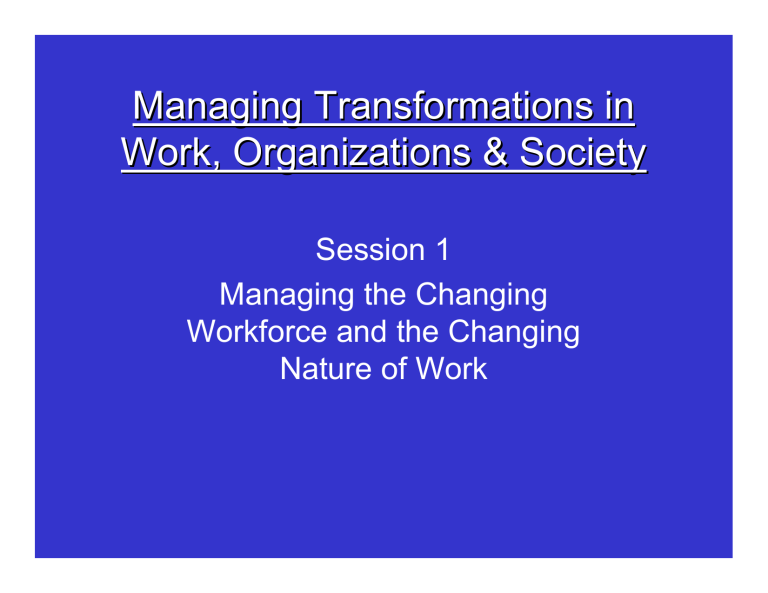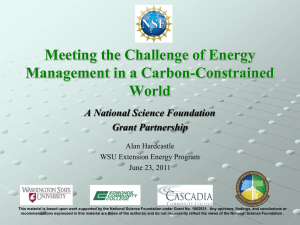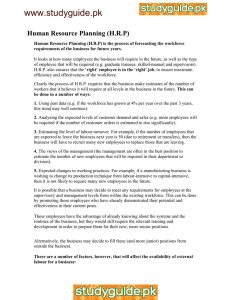Managing Transformations in Work, Organizations & Society Session 1 Managing the Changing

Session 1
Managing the Changing
Workforce and the Changing
Nature of Work
• An Experiment in Life Long Learning
Addressing the Challenges we face as
– Managers
– Individual Employees, and
– Citizens:
In:
Managing Transformations in Work,
Organizations, and Society
Sloan ’ ’ s
50 th
• McGregor’s Theory X & Y
– Do managers assume employees need to be controlled or empowered?
• Today’s Question – What should we assume?
– Is a manager’s job only to maximize shareholder value? or
– Is it a manager’s job to meet expectations of shareholders and other key stakeholders?
50 th
• Our task for the 50 th Anniversary:
Prepare a discussion paper exploring implications for the future of management
– Throughout the term, we will be collecting 1-2 page “vignettes” as part of an “application notebook” on each course topic
• Written by alums and students directly at the web site – based on personal experience – or written by students interviewing alums
– Students (individually and in groups) will also have responsibility to do a more detailed analysis of one of the course topics
Today ’ ’ s Learning Objectives
• Understand how the role of work has changed over the years, how the workforce is changing, and what has remained the same!
• Explore: What are the key challenges these changes pose for management today, and in the future?
Course materials aimed at building
:
– Awareness
• Introduction to concepts and ideas
– Working Knowledge
• Skills to apply concepts and ideas effectively
– Expert Knowledge
• Able to teach others to apply concepts and ideas effectively
• You are here to learn and – in specific cases, to teach others!
• Be a transmission belt--from individual to organizational learning
• Be an agent of change & innovation!
– Ensure that appropriate leaders in your organization anticipate a steady flow of difficult questions coming out of each session
Today ’ ’ s Format
• Course Design and Objectives (20 min)
• Check in: Introductions (5 min.)
• Framing Lecture: Work in Historical Context (20-30 min.)
• Discussion/clarification (20 min.)
• Break (15 min.)
• Site Specific Discussions (30-40 min.)
• Report outs and discussion (approx. 15-30 min.)
• Summarize key themes and action assignment (10-
15 min.)
Check In: Not your Typical MIT
• Engineering and Management Students in the classroom
• Students enrolled at distance work sites
• Peers at our students’ work sites
• Alumni—on line, providing vignettes, ready to be interviewed
• Industry Professionals from Leading
Organizations at a Distance
• Historical Context
• Moral Foundations
• Personal/Family Life
• Models of Employment Relations Past and Present
• Workforce Expectations: Past, Present
& Future
How has work changed over the years?
How is it being transformed by changing technologies, new ideas on how to organize work--on the factory floor, in offices, working at home or on the road, or in globally dispersed teams and organizations?
• Medieval Days: Work was for the Serfs!
• Marx (Karl or Groucho??): work to live or live to work?”
“Do we
• Today: Source of Identity, Economic
Necessity, Social Contribution….
Moral Foundations: Historical
• Thomas Aquinas: A Source of Dignity
• Protestant Ethic: Achievement means a
Healthy Soul--doing God’s Work!
• Catholic Social Teaching: The Living
Wage and Social Justice
• Efficiency--contribution to society
• Source of Dignity
• Solidarity & Social Cohesion
• Should support a Living Wage
• Equal Opportunity
• Voice and Democracy
• Subsidiarity--solve problems locally
• Agrarian Family
• Industrial Worker
• Total Overlap
• Separation:7-3:30; 9-5
• Organization Man • Separation--total commitment with spouse at home
• Service/New
Economy
• Blurred boundaries--
24/7; traveling technologies...
• Agrarian
• Craft
• Industrial
• Knowledge
• Social-Interactive
• Self sufficiency
• Skilled artisan
• Division of labor
• Learning & adaptation
• Emotional-customer service
• Pre-industrial
• Factory System
• The New Deal
• Information
Economy
• Self employment
• Hierarchical-employees & employers; labor as a factor of production
• Human rights at work
• A strategic asset-knowledge work
If work must fulfill multiple functions, then we need institutions, practices, and policies that support and enable them-in short we need a. . .
HOLISTIC, SYSTEMIC APPROACH to managing and governing work!
A Holistic View of Work
Individual Value
Economic Function
• security
• standards of living
• efficiency
• quality goods
& services
World of
Work
• dignity
• respect
• identity
• voice
• social interaction
Place in Society
Family
Community Citizenship
• The Old Social Contract: Loyalty for Security
– Male Breadwinner-Wife at home
– Long term, full time job
– Income, Security, Status increased with tenure
• Today’s realities:
– Variability in job duration; increased insecurity
– Risks shifted from firm to individual
– Variety of job types—standard, contractor, consultant…
– Diversity in workforce
• Is a new Social Contract Emerging???
Nature of work and the workforce have changed dramatically, but our institutions, policies, and practices for governing and managing work still reflect their origins in the industrial economy of the past
• Industrial Economy • Information Economy
• Domestic Competition • Global Competition
• Big Industrial Firm • Services--size varies
• Two groups: and workers managers
• Adversarial Relations
• Male Breadwinner with
Spouse at Home
• Diverse groups with blurred boundaries
• Mixed modes--conflict and cooperation
• Men & Women at Work-
-varied families
Update practices, institutions, and policies to catch up with the changes in the workforce and in work--to meet the needs of the modern economy, and the modern workforce and modern families!
Today ’ ’ s Discussion Task
• Trace how work has changed in your family through 3 generations: Your parents, your generation, your children.
• What values have carried over? What’s changed?
• What shaped your views of work?
• What is shaping your children’s views?
Report Out Questions
• What is the single most important factor shaping your expectations of work?
• How, if at all, will the expectations of your children have of work differ from yours?
• What are the implications of your answers to your organization and your role as leaders?
• In your organization – or an organization you select:
– Identify one organizational policy or practice that is a clear “disconnect” OR a new “connection” when it comes to the changing needs and expectations of the workforce
– Conduct a “root cause” analysis (consider using the
“5 whys”) to identify what accounts for the
“disconnect” or the “connection”
– Be prepared to discuss this in class next week – also, if appropriate, enter this as a vignette on the web site
• Work’s constants: Be “Multi-functional”
• Interpretive-Meaning: do!
We are what we
• Work is a Social Process
• Must have a Moral Foundation--or in the words of the Director General of the
ILO, we must provide “Decent Work”
Beware: Gen Yers are coming!
• Grew up in age of prosperity--winner take all economy
• Saw end of job security
• “Latch-key” kids who want more for their kids
• Comfortable using modern technologies
• More accepting of diversity
• More accustomed to rapid, constant change
• More exposures to scandals, violence…
• Less trust -- don’t count on social security.





